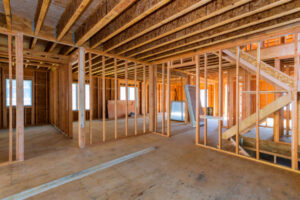Virginia, with its diverse geography, offers a spectrum of climates, from the balmy coastal plains to the crisp mountainous regions. Understanding your specific region isn’t just about knowing whether to pack sunscreen or a sweater, it’s a crucial step towards ensuring energy efficiency, comfort, and significant cost savings for your home. In this guide, we’ll delve into the intricacies of Virginia’s climate regions and how proper insulation can transform your living space year-round.
Understanding Virginia’s Climate Regions

Although the entire state of Virginia is classified as one climate zone, mixed humid climate zone four according to the Department of Energy website, the state boasts a wide range of differing climate regions and weather, due to its variations in elevation, proximity to the coast, and regional weather patterns. While Virginia is generally considered to have a humid subtropical climate, the distinct climate variations across our state may affect your home’s insulation needs.
Here’s a more detailed look at each region:
Region 1: Found in the eastern coastal areas, this region boasts mild winters and warm, humid summers. With high humidity levels and the occasional threat of hurricanes, moisture control and air sealing are top priorities for insulation, while moderate R-values suffice due to milder temperatures.
Region 2: Encompassing Tidewater and parts of the Piedmont regions, region two experiences hot, humid summers and mild winters. Here, higher R-values are recommended to combat summer heat gain and winter heat loss, with moisture control remaining crucial for comfort.
Region 3: Stretching across the Piedmont and portions of the Shenandoah Valley, this region sees hot summers, cool winters, and more temperature fluctuations than coastal areas. Balancing R-values is key to managing both summer heat and winter cold, alongside essential air sealing to ward off drafts.
Region 4: Nestled in the higher elevations of the Shenandoah Valley and parts of the Blue Ridge Mountains, region four enjoys warm summers and cold winters, occasionally blanketed in snow. Here, high R-values are indispensable for retaining heat in winter, with moisture control remaining crucial, particularly in basements and crawl spaces.
Region 5: At the highest elevations of the Blue Ridge Mountains and Allegheny Plateau, residents in this region experience short, cool summers and long, frigid winters with substantial snowfall. Optimal energy efficiency demands the highest R-values, coupled with meticulous air sealing to stave off heat loss and drafts and help you save money on your heating and cooling expenses.
Insulation Requirements in Virginia

When building a home in Virginia, builders must follow the insulation requirements laid out in the IECC Compliance Guide for Homes in Virginia, which is based on the 2018 International Energy Conservation Code (IECC). These specific mandates are tailored to our climate zone. Even with our differing topography, the same minimum insulation standards are required for every part of the state. This makes it vital to work with an insulation professional that’s experienced with your area’s climate region to look at every insulation consideration and ensure your home is properly insulated.
Remember, insulation is measured in R-value, which is a measure of an insulation’s ability to resist heat transfer. So, essentially, the higher the R-value, the better the insulating power to make your home more energy efficient.
Here’s a breakdown of the minimum insulation requirements in Virginia (as of 2021):
- Attics: An uninsulated attic requires a measured R-value of R-60 or R-49 if your attic already has 3-4 inches of installed insulation.
- Ceilings: Require an R-value of R-49 to ensure adequate thermal resistance and energy efficiency.
- Walls: Whether it’s mass walls, steel-framed walls, or wood-framed walls, insulation requirements vary, emphasizing a combination of cavity and continuous insulation for optimal performance.
- Floors: A minimum level of R-19 is required for floors over unconditioned spaces to ensure consistent comfort and energy savings.
- Basements and Crawlspaces: R-values for basement and crawlspace walls, along with proper air sealing, are essential for moisture control and energy efficiency.
Additional Notes on Insulation Requirements
If you’re renovating your existing home, be sure to consult with a qualified energy and insulation expert to be sure of any differing insulation requirements. There may be exceptions or alternative compliance paths for certain situations.
Air sealing works in tandem with insulation and is crucial for maximizing and maintaining energy efficiency and is often required in conjunction with insulation upgrades. Also, ducts located outside any conditioned space must be sealed and insulated to specific R-values.
When considering energy efficient home improvements, it’s important to explore the different types of insulation available for the job. There are many effective types of insulation, each with their own benefits. Spray foam insulation is an ideal choice for combining insulation and air sealing in one easy step, while cellulose insulation is a great blown-in option made of recycled materials, and fiberglass insulation is a budget-friendly classic that gives you the choice of batts or blown-in.
Insulation Requirements Resources
Access resources like the 2018 Virginia Energy Conservation Code (PDF), Virginia Uniform Statewide Building Code (USBC), and local building department websites for invaluable guidance for meeting insulation mandates effectively.
Insulation Requirements Important Considerations
Take these suggestions into consideration when working to create an energy efficient home with proper insulation and air sealing:
Energy Audits: Consider getting a home energy audit to identify the most effective insulation upgrades for your home. Be sure to choose a company that is properly certified and accredited to provide the knowledge and skills needed to pinpoint the exact areas of energy inefficiency in your home and provide tailored solutions, such as Toler Insulating.
Proper Installation: To ensure maximum insulating power, it’s imperative that your insulation is installed properly from the start. Trust the job to a professional for peace of mind and a job done right the first time.
Beyond Minimums: While meeting the minimum insulation requirements is essential, exceeding them can yield even greater energy savings and comfort, especially if you live in an area of Virginia with more extreme weather patterns. Consult with a professional to determine the ideal levels of insulation for your climate region.
Tax Incentives and Rebates

From federal tax credits to state and utility incentives, a plethora of financial incentives exist to offset the cost of energy-efficient improvements like insulation, air sealing, and HVAC upgrades. Here are some opportunities to read more about:
Federal Tax Credits:
- Energy Efficient Home Improvement Credit: This credit, part of the Inflation Reduction Act, allows homeowners to claim up to 30% of the cost of qualifying energy-efficient improvements on their tax return, including insulation, air sealing, energy-efficient windows and doors, and other items such as Energy Star certified heat pump water heaters.
- The maximum credit amount for insulation is $1,200.
- This energy tax credit is available through 2032.
State & Utility Incentives:
- Utility Company Programs: Many Virginia utility companies offer rebates and incentives for insulation upgrades and other energy-saving measures. Check out the Virginia Energy Sense site to see what programs are available through your local provider.
- Virginia Energy’s Home Efficiency Rebate Program: This program, another offering through the Inflation Reduction Act, will offer rebates up to $8,000 per household for energy retrofit projects that result in at least 15% energy savings. Qualifying upgrades include insulation, air sealing, and HVAC improvements. Please note that the Home Efficiency Rebate Program’s funding is anticipated to become available in early 2025. Visit the Virginia Energy “Consumer Rebates Frequently Asked Questions” page for more information.
Local Government Programs:
- Local Energy Alliance Program (LEAP): This nonprofit organization offers energy assessments and rebates for energy-efficient upgrades in Charlottesville and surrounding areas.
- Other Local Programs: Some counties and cities in Virginia may have additional energy efficiency programs. Check with your local government to see what’s available.
Tailored Solutions for Our Lynchburg Community and Beyond
Understanding our state’s insulation requirements and diverse climate regions lays the foundation for creating a home that’s not only more comfortable but also more energy-efficient and cost-effective in the long run. By leveraging available tax incentives and resources, as a homeowner, you can embark on a journey towards sustainable living while enjoying enhanced comfort and substantial savings.
At Toler Insulating, we’ve been providing top-notch insulation solutions to the homeowners and contractors of our Lynchburg community and beyond since 1994 and we’re here to serve you too. So, what are you waiting for? Take the first step and contact us today to speak with a member of our expert team and receive your free estimate for your Lynchburg home.